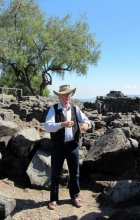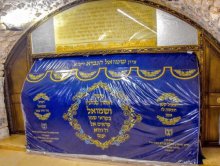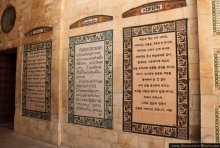 “We were fortunate to visit the very spot where several thousand years ago Abraham may have stood looking at the place that God chose for him to sacrifice his beloved son Isaac,” one of the participants of the study tour to Israel exclaimed emotionally. The trip was specially organized for IBT’s Bible translators from the Caucasus by the Jerusalem Center for Bible Translators.
“We were fortunate to visit the very spot where several thousand years ago Abraham may have stood looking at the place that God chose for him to sacrifice his beloved son Isaac,” one of the participants of the study tour to Israel exclaimed emotionally. The trip was specially organized for IBT’s Bible translators from the Caucasus by the Jerusalem Center for Bible Translators.
Each of these translators already had serious experience in Bible translation work. Some of them had translated quite a few books of the Bible, to say nothing of the annual training seminars, workshops, and tons of literature they read… All of that was an important school indeed. But only a school, whereas the study trip to Israel was described by one of the participants as “a university for Bible translators!” In less than two weeks, this “university course” was mastered, and more than that, it was experienced with the mind, the heart, and all five senses. On the very first day, one of their instructors promised, “You will see, smell, and feel this land.” “How true this was!” the Kumyk translator exclaimed on the evening of the very same day, surprised that the instructor’s prediction was fulfilled literally. “We were convinced of the truthfulness of these words right from the start.”
This was not the first time that the Jerusalem Center for Bible Translators (formerly known as the Home for Bible Translators) has welcomed a group from IBT. Each time, the JCBT staff prepare a slightly different study program, depending on their guests’ background knowledge and precise specialty in their translation projects. Nonetheless, their guests experience an unforgettably warm and welcoming atmosphere every time. This time the study tour group consisted of ten Bible translators from the Caucasus, representing seven translation projects, i.e. Abkhaz, Dargi, Ingush, Kabardian, Kumyk, Lak, and Tabasaran. One of the peculiarities of the situation was that the group was not completely made up of Christians. In fact, only four members were Christians and the rest were Muslims, which is not surprising given that Islam is the religion practiced by most of the Caucasus cultures. It was both an exciting and uneasy task for the JCBT staff to plan for this interconfessional group. Many questions arose as to whether the members of the group would be able to find a common language with one another and with their instructors. Would they be able to avoid disagreements and conflicts? “We gradually get acquainted with one another. Good communication is just as useful as good education,” the Dargi participant reported cheerfully on the second day of the trip, while his Tabasaran fellow traveler was provoked into philosophical meditation by what he experienced that day, “All that we’ve seen today is incredibly impressive, and I am more and more troubled by the question, why after such a long historical path do people still lack the understanding that there is but one God and that we should learn to live in peace and harmony rather than mortal enmity?”
 Though it was an educational trip, our translators managed to be not only scholars but also pilgrims: “I never dreamt that I would have an opportunity to touch the sarcophagus of the prophet Samuel with my own hand – my impressions are inexpressible!”; “To tread the stones stepped on by the prophets thousands of years ago is beyond comprehension!”; “We saw firsthand the places where Abraham wandered with his flocks. I was awe-stricken.” And it was a Muslim who wrote the following lines in his travel diary: “Isn’t it the ultimate dream of anyone who has any contact with the Bible to visit the very place where Jesus was baptized? For me this dream came true today.”
Though it was an educational trip, our translators managed to be not only scholars but also pilgrims: “I never dreamt that I would have an opportunity to touch the sarcophagus of the prophet Samuel with my own hand – my impressions are inexpressible!”; “To tread the stones stepped on by the prophets thousands of years ago is beyond comprehension!”; “We saw firsthand the places where Abraham wandered with his flocks. I was awe-stricken.” And it was a Muslim who wrote the following lines in his travel diary: “Isn’t it the ultimate dream of anyone who has any contact with the Bible to visit the very place where Jesus was baptized? For me this dream came true today.”
The IBT group consisted of scholars, university professors and men of letters (and they were, in fact, all men). But even for them, people who already had a broad vision and extensive life experience, the trip to Israel came as a real cultural shock that turned a number of firmly held apprehensions upside down. Let’s listen to their personal discoveries: “Today I learned that the well into which Joseph was thrown by his brothers was not really a well, but a cistern for collecting rainwater”; “I was absolutely sure that a desert is a bare sandy steppe, but the Judean Desert is something else entirely. I’ll have to think about this when translating certain episodes in the Bible”; “I stood looking at the manger and thinking if I had previously properly understood what a manger was. The answer was no. When translating this word I’ll have to decide whether it needs a footnote. The Bethlehem manger is quite different from the Dargi manger”…
“Many previously translated texts will require revision, many terms will need to be changed,” one of the group members summarizes. “And if we have difficulty in finding the right word, it’s OK, we’ll try our best and eventually find a solution. What is more important is that now we know exactly what stands behind so many Biblical terms,” echoes another group member.
The translators also immersed themselves in the symbolic depths of many Biblical texts. Several of them noted that in Jdg 14:3, where we find the story of Samson and his Philistine bride, there is a phrase commonly translated into various languages as “she pleases me well”, while the original literally reads “she has found favor in my eyes.” Taking into account the fact that Samson’s eyes were later gouged out, that he loved with his eyes alone and tragically lost them, our translators mentioned that in such places a more literal translation may be necessary for conveying the depth of the Biblical text. When visiting the Garden of Gethsemane one of our translators recalls that “the instructor called our attention to the symbolism of the word Gethsemane (olive oil press). Indeed the earthly path of Jesus was as heavy as being crushed in a press…”
 By the end of the trip several translators were already forming daring creative plans. “An idea crept into my head to write a cycle of poems on Biblical themes in my native Tabasaran language. This should definitely attract Tabasaran readers’ interest to the Bible”; “I decided that when I return home I’ll try to produce a translation of “Our Father” in both variants of the Cherkess language. We will then send it to Israel decorated with the Cherkess national ornament so that our tongue would also adorn the walls of the Church of the Pater Noster on the Mount of Olives.”
By the end of the trip several translators were already forming daring creative plans. “An idea crept into my head to write a cycle of poems on Biblical themes in my native Tabasaran language. This should definitely attract Tabasaran readers’ interest to the Bible”; “I decided that when I return home I’ll try to produce a translation of “Our Father” in both variants of the Cherkess language. We will then send it to Israel decorated with the Cherkess national ornament so that our tongue would also adorn the walls of the Church of the Pater Noster on the Mount of Olives.”
One of the travelers to Israel also expressed his hearty wish to IBT staff members: “May God grant you patience and strength to complete what you have started. It’s a very hard and complicated process, but the Almighty is always close to those who do His work. And the Bible is the Word of God, so translating the Word of God is His work.”
We would greatly appreciate your financial assistance towards IBT projects.
If you prefer to send your donation through a forwarding agent in the U.S. or Europe,
please write to us and we'll provide the details of how this can be done.

Share: